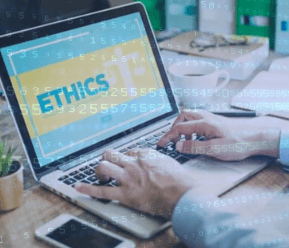

Inside the World of Ethical Hacking
This article is broken into 3 parts where we explore the tools and methods ethical hackers use, their real-world impact, and the compelling stories behind the people who stand between us and the ever-present threat of cybercrime.
Part 1
Guardians of the Digital Frontier
In the shadows of cyberspace, where malicious hackers seek to exploit vulnerabilities, there exists a different kind of digital warrior: the ethical hacker. Often called “white hats,” these professionals use their skills to strengthen security and protect organizations from cyber threats. While their work often goes unnoticed, their contributions are essential to safeguarding the digital frontier.
What Is Ethical Hacking?
Ethical hacking involves using the same techniques as malicious hackers but with permission and for a constructive purpose. These experts simulate cyberattacks to uncover weaknesses before real attackers exploit them.
“Think of ethical hackers as digital locksmiths,” explains Jacob Moore, a Certified Ethical Hacker (CEH). “We test the locks on the systems, find weaknesses, and fix them to prevent unauthorized access.”
Organizations hire ethical hackers for various tasks, including penetration testing, vulnerability assessments, and threat hunting. Their ultimate goal is to outthink malicious actors and strengthen cybersecurity defenses.
The Tools and Methods of Ethical Hackers
Ethical hackers use a wide range of tools and techniques to uncover vulnerabilities. Here are some of the most common:
- Penetration Testing Tools: Tools like Metasploit and Burp Suite help simulate attacks to identify vulnerabilities.
- Network Scanners: Tools such as Nmap and Wireshark analyze network traffic to detect weak points.
- Password Cracking Tools: Ethical hackers use tools like Hashcat and John the Ripper to test the strength of encrypted passwords.
- Social Engineering Simulations: Ethical hackers mimic phishing scams to evaluate an organization’s human vulnerabilities.
These tools are paired with a methodical approach that often involves reconnaissance, gaining access, escalating privileges, and finally, reporting findings to the organization.
Part 2
Profiles of Ethical Hackers
Riya Patel: Securing the Financial Sector
Riya Patel, a lead ethical hacker at a global bank, has spent the last five years protecting sensitive financial data. Her team’s efforts have thwarted multiple cyberattacks targeting customer accounts.
“Every test we run could save millions of dollars and protect countless customers,” Riya shares. Recently, her team discovered a critical vulnerability in the bank’s mobile app, allowing them to patch the flaw before it could be exploited.
Carlos Rivera: Protecting Critical Infrastructure
Carlos Rivera specializes in securing critical infrastructure, including energy grids and water treatment facilities. “These systems are a prime target for nation-state actors and cyberterrorists,” Carlos explains.
Last year, Carlos and his team uncovered a backdoor planted by attackers in a power grid system. Their quick action prevented a potential blackout affecting millions.
Elena Novak: The Phishing Buster
Elena Novak runs phishing simulations for Fortune 500 companies. Her work has helped reduce phishing success rates by over 40% within client organizations. “People are the weakest link,” Elena notes, “but they can also be the strongest defense when properly trained.”
Success Stories in Ethical Hacking
Stopping a Major Ransomware Attack
In 2023, a team of ethical hackers identified vulnerabilities in a manufacturing company’s network. By patching these flaws, they prevented a ransomware attack that could have halted production for weeks and cost millions in losses.
Safeguarding a Government Election System
During the 2024 election cycle, ethical hackers tested the security of online voter registration systems. Their efforts uncovered significant weaknesses, leading to critical updates that ensured a secure and fair election process.
Preventing Data Breaches
A healthcare organization recently avoided a major data breach thanks to the efforts of ethical hackers. By uncovering a misconfigured server, they prevented sensitive patient information from being exposed online.
Part 3
The Challenges and Rewards of Ethical Hacking
Ethical hacking isn’t without challenges. Hackers often face tight deadlines, complex systems, and the pressure to stay ahead of evolving threats. Additionally, there’s a fine line between ethical and unethical hacking, and professionals must adhere to strict legal and ethical guidelines.
Despite these challenges, ethical hackers find their work deeply rewarding. “Knowing that our work protects people and organizations keeps us going,” says Jacob Moore. “We’re not just fixing systems; we’re making the digital world safer.”
The Unsung Heroes of Cybersecurity
Ethical hackers are the guardians of the digital frontier, working tirelessly to protect organizations from evolving cyber threats. Their tools, methods, and expertise are critical in an era where data breaches and cyberattacks are becoming increasingly common.
By highlighting their stories and contributions, we gain a deeper appreciation for the individuals who ensure our digital safety. As technology continues to advance, ethical hackers will remain an essential line of defense in the fight against cybercrime.
Stay tuned to Cyber News Live for more stories about the people shaping the future of cybersecurity.
This article was authored by Ronald Gross. Ron is a versatile writer and podcaster with a background in advertising copywriting. Ron’s knowledge of technology and security goes back to when he was working with Agencies in New York City on Tech & Security clients. He has written editorial articles on security, cybersecurity, and technology. Ronald always brings a wealth of experience and passion to everything he writes, producing work that informs and inspires.
If you’d like to be a freelance journalist, writer, or weekend warrior with Cyber News Live, please email us at contact@cybernewslive.com. Thank you!
